Try GOLD - Free
South African avocado production: a success story
Farmer's Weekly
|Farmer's Weekly 27 December 2024
Avocado production in South Africa has expanded markedly since the industry's humble beginnings over 80 years ago. From a small grove planted in 1938 in what was then Nelspruit, the industry has blossomed to seven million trees planted on 20 000ha. Dr Guy Witney, project manager at Great Brak Avos, spoke to Annelie Coleman about the country's avocado production.

Dr Guy Witney, project manager at Great Brak Avos in Mossel Bay, Western Cape, says avocados likely originated from the mountainous rainforests straddling Mexico and Guatemala. Today, wild avocados are found in the coastal tropical lowlands and mountainous highlands of Central and South America.
Avocados were probably introduced to South Africa by Dutch settlers coming from the West Indies between 1652 and 1700.
“Interestingly, in some parts of South Africa, large, low-oil fruit from West Indian seedling trees, often referred to as ‘butter avocados’, are still common backyard trees and are preferred over higher-quality MexicanGuatemalan hybrid avocado varieties introduced later from California,” he explains.
HASS AND FUERTE
Between 1932 and 1938, the first experimental avocado cultivar evaluation block was planted by the then department of agriculture near Mbombela, then known as Nelspruit.
Once it was confirmed that imported California varieties performed well in the region, the first commercial plantings took place in the same area in 1938. These first commercial plantings were mainly of the Fuerte variety and were established in the mountainous areas of the Lowveld near Tzaneen and Mbombela.
“Although there are hundreds of varieties of avocado in the world, around 90% of crossborder international trade in avocados is of the Hass variety. This variety is also the main cultivated variety in South Africa, followed closely by Fuerte. Other important varieties grown in South Africa are GEM, Lamb Hass, Maluma, Carmen, Pinkerton, Ryan, and Reed.
“Mexican-Guatemalan hybrid varieties introduced from California in the 1930s now dominate commercial production in South Africa. The green-skinned Fuerte dominated production until early in the 21st century, and while it remains important, it has been overtaken by Hass and newer dark-skinned Hasslike varieties like GEM and Lamb Hass,” says Witney.
This story is from the Farmer's Weekly 27 December 2024 edition of Farmer's Weekly.
Subscribe to Magzter GOLD to access thousands of curated premium stories, and 10,000+ magazines and newspapers.
Already a subscriber? Sign In
MORE STORIES FROM Farmer's Weekly

Farmer's Weekly
Pastry delights and cupcakes
The versatility of pastry in baking and cooking is best flaunted by two vastly different recipes appealing to the sweet and savoury tooth, while a novel way to bake those Christmas-themed cupcakes will also go down well.
4 mins
December 5-12, 2025
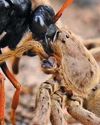
Farmer's Weekly
Specialised spider-hunting wasps
Wasps are apex predators of the insect world and have developed many survival strategies. One group of wasps focuses on hunting spiders to provide a source of food for their larval offspring
2 mins
December 5-12, 2025
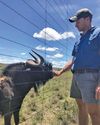
Farmer's Weekly
From bulls to boardrooms: farming part-time as a professional
Maintaining a farm requires time, resources, and commitment. Farming part-time while being fully employed elsewhere can seem daunting and risky. Although it certainly presents unique challenges, it is feasible for some. Koot Klopper and Herman van Heerden spoke to Henning Naudé about how excellent time management and the delegation of resources, as part-time farmers, successfully keep their farms productive.
5 mins
December 5-12, 2025

Farmer's Weekly
Holy Shiitake: mastering the science of gourmet fungi
Mushroom production is inherently the practice of expanding mycelium. But since wanted and unwanted fungi flourish under the same circumstances, a mushroom farmer's biggest challenge is ensuring the right fungi prevails. Lindi Botha reports on Rory Brooks' learning curve.
9 mins
December 5-12, 2025
Farmer's Weekly
No more 'secret' price hikes?
'Secret' electricity price hikes in South Africa have been curbed in a game-changing court ruling, explains Felix Dube, lecturer in the Department of Law at the University of Venda.
4 mins
December 5-12, 2025
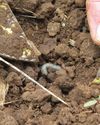
Farmer's Weekly
The cutworm scourge, and how to control it
The dominant cutworm, Agrotis segetum, is causing renewed, costly damage to South African maize, soya bean, and sunflower.
5 mins
December 5-12, 2025
Farmer's Weekly
Legislative gap requires a rethink on biosecurity controls
Since the dawn of democracy, the agriculture sector has cemented its place as one of the essential and trusted pillars for economic growth, job creation, and foreign earnings in South Africa.
2 mins
December 5-12, 2025

Farmer's Weekly
From kitchen experiments to a thriving meat empire
What started as an after-hours kitchen project in the Truter household has grown into the fully fledged meat empire Deli-Co. Brothers Pieter and Hendri Truter told Glenneis Kriel how they turned a local favourite into a multigenerational family business.
7 mins
December 5-12, 2025
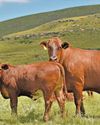
Farmer's Weekly
Brushing up on your 'cow speak'
Experienced stockman and cattle judge Willie de Jager spoke to Sabrina Dean about some of the basics of reading cattle behaviour and how best to handle these animals.
8 mins
December 5-12, 2025
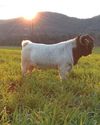
Farmer's Weekly
Corporate day job fuels farming dream
Marius Smit lives in the middle of Gauteng in Centurion and spends his workdays in the fast-paced high-stress corporate sector as a group forensic head for Discovery.
5 mins
December 5-12, 2025
Listen
Translate
Change font size
